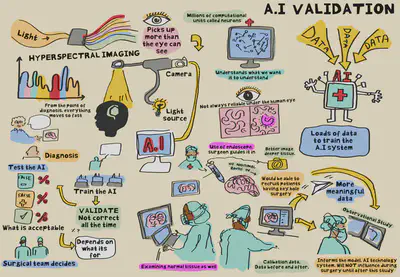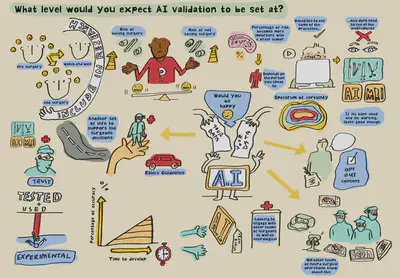Science for tomorrow's neurosurgery: Patient & Public Involvement (PPI) group - September 2022 group meeting
We are working to develop new technologies that combine a new type of camera system, referred to as hyperspectral, with Artificial Intelligence (AI) systems to reveal to neurosurgeons information that is otherwise not visible to the naked eye during surgery. Two studies are currently bringing this “hyperspectral” technology to operating theatres. The NeuroHSI study uses a hyperspectral camera attached to an external scope to show surgeons critical information on tissue blood flow and distinguishes vulnerable structures which need to be protected. The NeuroPPEye study is developing this technology adapted for surgical microscopes, to guide tumour surgery.

Both studies are guided by the Science for Tomorrow’s Neurosurgery patient involvment group, which explores the complex issues of bringing artificial intelligence and new technologies into patient surgeries. The group met on the 21st of September 2022 to discuss how information about new technologies can best be discussed with patients in their treatment journey – and the difficult question about how artificial intelligence systems should be validated for patient use.
Rick Debnath, a post doctoral researcher in machine learning, gave a presentation on how machine learning systems are “trained” and “tested” using known information from previous patients. This facilitated a lively discussion on consent for research, particularly relating to the use of anonymised information to train computing systems. The group felt given the importance of the work, a system of opt out consent could be considered – allowing information to be used in research, but making sure ultimate control remains with the patient!

The team went on to discuss how new systems are validated for use, and how to decide when it is ready for use guiding surgeries. All involved felt that it was important that new imaging and AI systems acted as additional tools but that the operating surgeon remained the ultimate decision maker. The group emphasised preparing for brain surgery is a stressful, difficult time – and most felt that at that stage the decision on introducing new technologies should be with the surgeon. Raising the interesting point of how hyperspectral data can be fed into the neurosurgeons’ toolkit as smoothly as possible – and how to roll out training to make beneficial technologies available to as many surgeons as possible.
All were interested to review the progress being made in the NeuroHSI study and were able to guide further study developments, reviewing new protocols to bring hyperspectral cameras even closer to neurosurgeries using endoscopes that enter safe “approach corridors” in the brain.
If you have been diagnosed with, or treated for a brain tumour and would be interested in helping to guide cutting edge research in neurosurgery and AI please contact the NeuroHSI team or NeuroPPEyeI team to enquire about space in the Science for Tomorrow’s Neurosurgery PPI group.
To learn more about the project, please visit our neurohsi.uk and neuroppeye.uk pages.